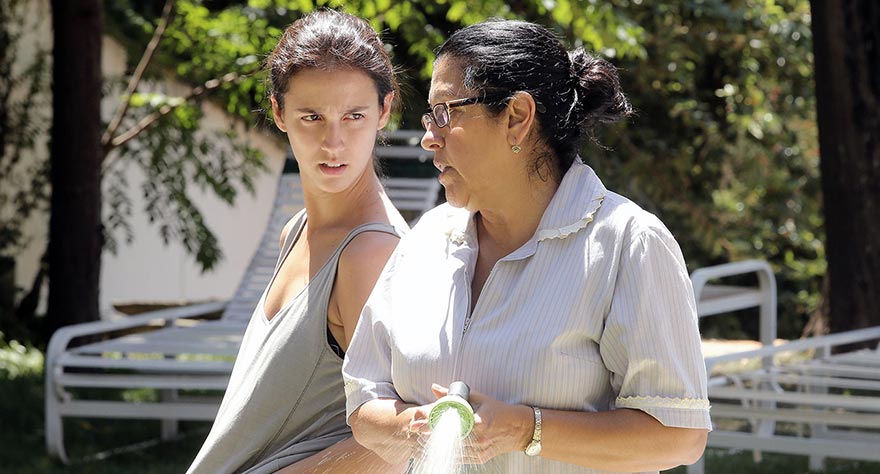
Casting its lens on a Bralizilan housekeeper, this familial drama skirts around the class issues at its core.

Casting its lens on a Bralizilan housekeeper, this familial drama skirts around the class issues at its core.
Very often, a film that has social critique at its core will target its message directly, providing both a clear stance and unforgiving criticism. The Second Mother chooses, for better or worse, to instead use a very light touch, frequently skirting around the class issues it raises in favour of a more humanistic approach, focusing on the development and progression of its characters and their lives. The result is a charming tale that manages to be quite refreshing, but then conversely lacks enough conviction in its own characters to let them reach a more honest and daring conclusion.
The Brazilian film, originally titled Que Horas Ela Volta? (When Will She Return?), centers around Val, a middle-aged woman who has been working as housekeeper for a wealthy family in São Paulo for over 10 years. Having practically raised her employer Barbara’s son, Fabinho, she has become incredibly close to him, and he evidently feels as much her son as she feels his second mother. Val is also blissfully unaware of the disdain Barbara has for her, content with knowing her place in the house and Barbara’s superficial friendliness. The only real aspect of her life for which Val feels any sorrow is the fact that in order to earn money, she has had to leave behind a child of her own—a daughter whom she has entrusted into the care of her former partner’s new family.
Val clearly loves her daughter Jéssica, and the guilt over not being able to raise her is constantly evident in her actions, meaning when she receives an unexpected call from Jéssica asking if she can stay with Val for a short time, she doesn’t have to think twice. Jéssica is hoping to attend a university in São Paulo to study architecture and needs a place to stay while she takes the entrance exams—the same exams Fabinho will also be taking. Jéssica’s arrival is the turning point in Val’s life but not at all in the way she expects. Jéssica has no respect for the unspoken boundaries Val lives by in her employer’s house, instead preferring to be treated as an equal. She has no tolerance for either the way in which her mother is treated, nor the way in which her mother accepts her situation quietly. Fabinho, and Barbara’s husband Carlos in particular find themselves quickly drawn to Jéssica’s artistic and rebellious nature while Barbara feels personally offended by the lack of humility she perceives Jéssica to have.
It’s a simple premise, but the film’s refusal to shy away from the awkwardness of any situation makes it not only honest but also often genuinely funny. Scenes that are so bare and basic would typically seem insignificant, but The Second Mother has such an atmosphere of raw honesty penetrating each moment that they seem instead to be rather radical. Paired with the frequent use of long takes, director Anna Muylaert creates a household that feels both thoroughly organic and hilariously trivial. This is where the film’s true strength lies—despite being set in a very specific household in Brazil, it speaks to a whole world of working class women. It lives so earnestly in each of its inconsequential events that we can’t help being drawn into them, feeling the daily proceedings of the characters as if they were our own.
But there is no doubt that the film has its own misgivings, the most disappointing of which is its hesitancy to create true conflict, choosing to avoid any real discord. A misguided attempt to avoid drama, it instead leads to a feeling of dissatisfaction, making the ending—pleasant as it is—seem much more contrived and much less meaningful. Perhaps Muylaert made an artistic decision to steer clear of flagrant class critique, which is indeed effective in a film such as this, but by building the characters towards a confrontation and then refusing to resolve it, she leaves the audience frustrated and sceptical. Indeed, with a genuine resolution of the characters’ relationships, the beauty and mirth of the ending would have seemed much more deserved.
Actors Regina Casé as Val and Camila Márdila as Jéssica are particularly noteworthy, bringing a level of integrity to their characters that is rarely seen; it is hard to imagine the film having nearly the same level of emotional payout or impact without the unspoken way in which these two so unnoticeably fit the skins of their characters. The Second Mother thus manages to lift itself beyond its uncertainty and maintain an honest relationship with the audience. Nevertheless, it could have lifted itself into an entirely different tier with a more daring perspective on its subject.